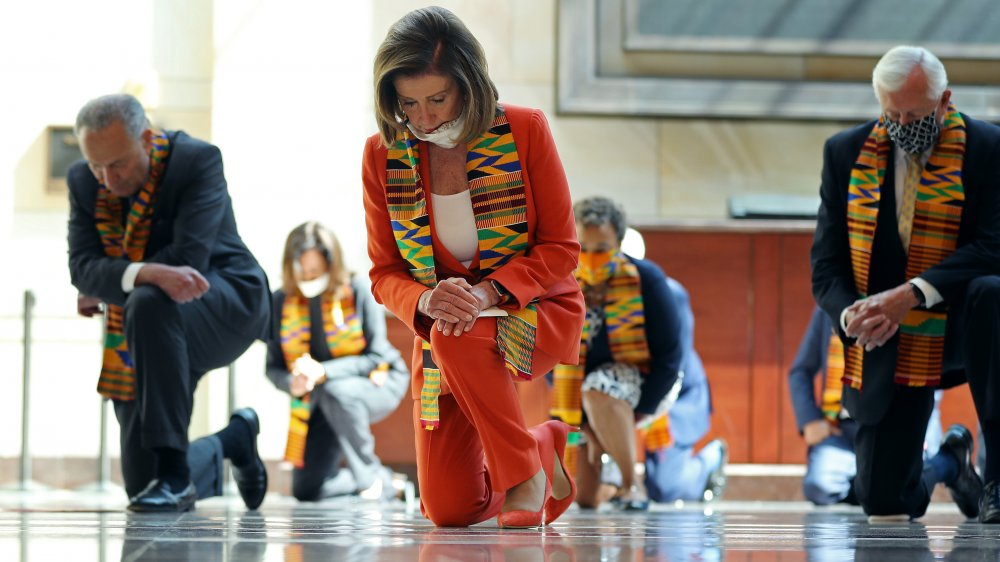The Real Meaning Of Kente Cloth
Quick: what do George Floyd and Kente cloth have in common? Congressional Democrats were accused of using both of them in a photo op masquerading as a meaningful gesture. Per Fox 4 in Kansas City, amid nationwide unrest and demonstrations protesting brutality and racial bias by cops, Dems donned Kente stoles and held a moment of silence in honor of Floyd, who died under the suffocating knee of a police officer. Critics were not so silent, voicing their frustration that the virtue-signaling politicians hadn't passed way-overdue legislation instead of, as screenwriter Eric Haywood put it, "dressing up like a Wakandan chess set."
Obviously, Kente cloth doesn't come from Wakanda — Black Panthers do. The Kente cloth comes from Ghana and as a rich history and symbolism. We won't insult your intelligence by pretending that a random internet writer from America can tell you "the real meaning of Kente cloth" by regurgitating a few researched facts. Google is great, but it's not a miracle worker. Even so, hopefully at least some semblance of the actual meaning can be gleaned.
Along came a spider
According to the University of Maine Hudson Museum, the word "Kente" means "basket" in the Asante language, and the cloth is deeply interwoven in the Asante culture of Ghana. According to lore, a couple of buddies named Ota Karaban and Kwaku Ameyaw received a masterclass in weaving by watching a spider spin its web. Those friendly neighborhood spider men gathered up fibers from the raffia palm and began weaving, and sometime in the 12th century, the Kente cloth tradition was born.
Traditionally handwoven with a wooden loom, the Kente cloth contains shapes and colors that have their own special significance in the larger web of shared cultural values. For instance, blue stands for "peace and harmony", green for "good health," yellow for "wealth and energy" and pink for "femininity" or caring/tenderness. The cloth was historically worn by royals and important figures on special occasions. So you can see what it has to do with George Floyd and the U.S. Congress's rejection of injustice: nothing.
The difference between an opportunity and opportunism
It's tempting to say that Congressional Dems really put their foot in it, but they were kneeling. So at least no one can accuse Nancy Pelosi and company of pretending to take a principled stand. You might wonder what the fuss is about. Why are people shawl-shaming politicians? The U.S. is a free country after all, at least for some people. Besides, wearing Kente stoles doesn't mean U.S. politicians stole Ghana's culture. And even if it did, that would still be a huge upgrade from when Americans stole Ghana's people.
The issue isn't cultural appropriation, however, but rather inappropriate inaction that has plagued U.S. politics and allowed injustice to fester for decade after decade. Obviously, this article can't speak for everyone. The chairwoman of the Congressional Black Caucus, Karen Bass called the cloth an emblem of "our African heritage" and argued that the white lawmakers wearing it were showing "solidarity." And that's obviously a valid view. Of course, in the current context, it might understandably look like a flash distraction from long-delayed justice, which, as Martin Luther King Jr. reminds us, "is justice denied."


